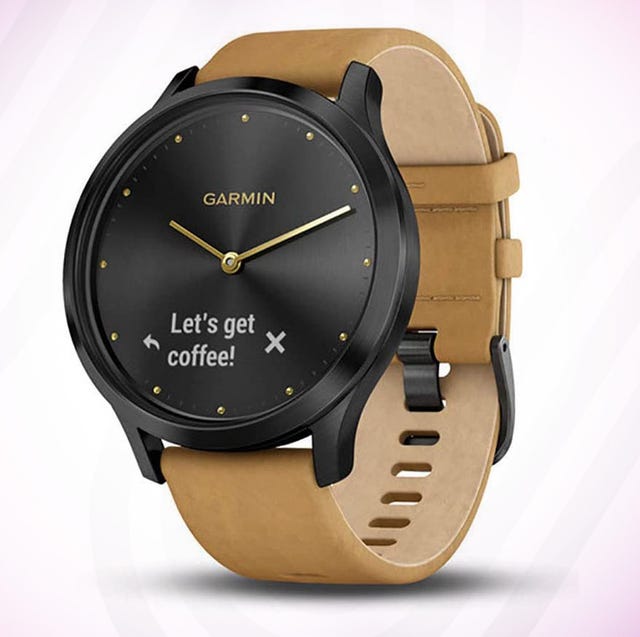
Best Fitness Trackers 2022 | GPS Smart Watches for Runners

Staff, Courtesy of Garmin
Today’s fitness trackers aren’t just narrow silicone bands that count your steps and estimate how much time you’ve spent sleeping or walking—many pack all the health metrics and connectivity of a high-end smart watch. In fact, as trackers add new smart functions and take on a more traditional watch-shaped profile, the line between the two categories has become blurred. Both types include sport-specific features like activity tracking and GPS workout modes, as well as sensors to monitor everything from your active heart rate to your overnight blood-oxygen levels. These features can track your health, help you achieve your fitness goals, or just encourage you to spend more time in motion.
From daily active minutes to advanced sleep metrics and period tracking, there’s a wide range in the functionality and price of fitness trackers, which makes shopping for the best one such an individual pursuit. In this guide, we cover the best fitness trackers—and fitness-tracking smart watches—along with tips and advice for finding the best one for you.
Best Fitness Trackers
- Best Smartwatch Bargain: Apple Watch SE
- Best Smartwatch-Fitness Tracker Hybrid: Fitbit Charge 5
- Best Budget Fitness Tracker: Fitbit Inspire 2
- Best Everyday Garmin: Garmin Venu 2
- Most Stylish: Garmin Vivomove HR
- Best Non-Wrist Tracker: Oura Ring Gen 3
- Best All-Around Fitbit: Fitbit Versa 3
- Exhaustive Running Metrics: Garmin Forerunner 945
- Best Fitness Tracker for Kids: Fitbit Ace 3
- Most Versatile Smartwatch: Apple Watch 7
The Expert: I’ve been testing, reviewing, and writing about running and cycling gear for more than a decade; in that time, I’ve had the chance to test dozens of fitness trackers and smart watches. I’m also something of a data nerd, with a year-round tan line from wearing my Fitbit or Garmin for everything from GPS tracking ultramarathons to counting dance steps on my wedding day. As a product reviewer, my work has appeared in Runner’s World, Bicycling, Popular Mechanics, Wirecutter, Baby Center, and more.
What to Consider When Choosing a Fitness Tracker
Health and Fitness Features
Step-counting accuracy is one of the most important features a fitness tracker can have, but most trackers have reliable accelerometers that can be further recalibrated to track your steps, stride length, and distance with more accuracy if needed. Even the most basic fitness trackers can also calculate your basal metabolic rate, or the rate at which you burn calories, using your “active minutes” and activity data; however, this number is greatly aided by a heart rate sensor, which also makes it easier to grab sleep data. The most advanced health trackers, like the Oura Ring, will even take your body temperature to calculate more data, like your expected cycle date.
Run-Specific Metrics
Runners who want to track their sleep, steps, general activity, and 24/7 heart rate—as well as their dedicated workouts—will likely want a watch or tracker with accurate, built-in GPS. Some, like the Garmin Forerunner 945, will even track your running metrics in depth and build custom workouts for you, as well as generate maps and routes on the fly. These features can be as fun and useful for your training as they can be unnecessary and exhaustive, depending on your intended use of the tracker. If you want a cheaper tracker to track your runs and sync to Strava but don’t need all that functionality, look for any base-level model with built-in GPS.
More Ways to Track: Waterproof Fitness Trackers • Advanced GPS Watches • Running Watches Under $200 • Fitness Trackers for Kids
Social Features and More
Some smart watches put both a fitness tracker and the functionality of a full computer at your wrist. These bonus features include app access, message and calendar notifications, and music streaming and storage—as well as virtual payments through Garmin or Apple Pay. If you want a tracker that offers these functions, you can find most of them available through an Apple Watch, Garmin, or some Fitbits; for a more streamlined health and fitness tracking experience, look to the Fitbit Inspire 2 or Oura Ring Gen 3.
How We Selected These Fitness Trackers
I chose the fitness trackers and smart watches here based on my personal experience with many of them, in addition to test input from the extended Runner’s World team. I also reached out to fellow data-obsessed runners and fitness nuts in my social media circles, and scoured reviews online. The resulting recommendations are designed to take into account the range of features and uses that people are seeking from their trackers. These are the best 10 models I’ve found based on accuracy, user experience, features, and value.
This content is created and maintained by a third party, and imported onto this page to help users provide their email addresses. You may be able to find more information about this and similar content at piano.io




